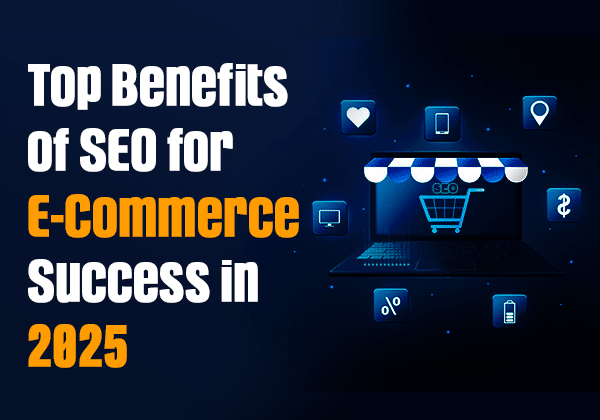Top Benefits of SEO for E-Commerce Success in 2025

In the digital age, SEO for e-commerce is no longer a luxury, but a necessity. It is the magic potion that brings an online store to the top of search results, making it visible to the world. And that is far from all.
With SEO for e-commerce, you don’t just attract traffic – you attract the right traffic: people who are actively searching for your products and are ready to click the “buy now” button. In essence, you have a sales rep who never sleeps and is always ready to engage potential customers.
But the benefits of optimization go beyond visibility and traffic. SEO for eCommerce can also help you build trust, improve user experience, and gain a competitive advantage. If you haven’t optimized your online store yet, now is the time to start.
Increase your online visibility
Perhaps the key benefit of SEO for e-commerce is the ability to significantly increase your company’s online visibility. In a highly competitive digital market, appearing on the first page of search results is not just a sign of success, but a vital necessity. Website optimization will help you get to the top of search results, thereby providing that all-important online presence to attract potential customers.
You may have a fantastic product range or exceptional customer service, but none of that matters if your target audience can’t find your site through a search query. This is where eCommerce SEO can make all the difference. Optimizing your eCommerce website increases your chances of appearing in relevant search results, closing the gap between you and your potential customer base.
The results that search engines show have a significant impact on website traffic. Most of the search traffic goes to the first page of results in Google, Yandex and any other search engine.
Your online visibility isn’t just about attracting general traffic, it’s about attracting the right traffic. SEO ensures that users don’t just stumble upon your site by accident, but visit it when they’re actively interested in buying your products. Effective optimization strategies put your brand on the first page of search results when potential customers need you most, increasing your chances of conversion.
So, eCommerce SEO is not just about increasing your online visibility. It’s about having a meaningful and relevant presence that will build a bridge between your business and potential customers. Your concern shouldn’t be whether your site shows up in search results. It’s whether you show up in relevant search results at the right time. Store optimization gives your online presence a vital boost, encouraging customers to click, engage, and buy.
Increasing your presence with SEO for eCommerce lays the foundation for your business to grow and succeed online. This will help your potential customers, partners, and even competitors discover you. Remember: a visible brand is an accessible brand. Search engine optimization lays the foundation for a successful business in the digital market.
Targeted traffic generation
Imagine a well-designed shopping mall where each customer walks into a store that exactly matches their needs. No wandering, no wasted time – the person gets what they need right away. That’s exactly what eCommerce SEO does for your online marketplace. It doesn’t just throw random users at you, it connects you with those who are already interested in what you have to offer. Yes, SEO drives targeted traffic – traffic that matters!
Keyword optimization is at the core of this strategy. Your goal is not just to get as many people to your site as possible, but to attract the right audience. Specific, high-quality traffic that is more likely to convert increases your ROI. Let’s say you sell vegan cosmetics in California. You want your online store to appear in search results for the search term “vegan cosmetics California.” You can do this through SEO.
Understanding SEO requires analytics. This is where data science comes in. With the right tools, you can easily analyze user behavior, track their preferences, and adjust your SEO strategy accordingly.
Pay attention to key metrics
- Organic traffic is the number of visitors who come to your site from unpaid sources (search results).
- Bounce rate is the percentage of visitors who leave a site after viewing just one page.
- Conversion rate is the percentage of visitors who complete the desired action (make a purchase or subscribe).
These and other metrics provide important data to improve your SEO strategy. They help you understand what works and what doesn’t. You’ll be able to spot pitfalls early and change your approach to search engine optimization.
Remember that high-quality targeted traffic translates into leads, higher engagement, and increased conversion rates. So, effective SEO is not just about visibility, it’s about quality, relevance, and greater profitability. Isn’t that what every business owner wants to achieve?
Increasing credibility
When talking about SEO, you can’t ignore its impact on your online store’s credibility. The trust factor is a significant benefit of investing in SEO for eCommerce.
High rankings on search engine results pages (SERPs) largely determine how trustworthy your website is to potential customers. This goes without saying. Think about your own internet search habits. When you search for something on Google, the first results that appear are more trustworthy than the rest, right? This is where the importance of website authority in SEO comes in.
You need to understand that your online store needs to be seen by the right people – your target audience. When you are seen by users who are already interested in your offers, you prove your relevance, which strengthens the authority of the site.
There are other benefits to having a high trust level. In addition to increasing click-through rates, it also helps your store visitors move through the sales funnel more efficiently. Remember: if users trust your site, they are more likely to trust your brand and products. Maintain that trust, and you’ll be one step closer to converting a visitor into a buyer.
It’s worth noting that eCommerce SEO isn’t just about page rankings. It also involves refining your site to improve the user experience. An optimized online store offers easy and clear navigation and provides high-quality, relevant content. These components together not only meet Google’s algorithm requirements, but also help build your site’s authority. Using analytics and data science, you can continually monitor, adjust, and improve your SEO strategy and store to improve the user experience.
Adding positive customer reviews to the mix will create a compelling argument for your site and products, further strengthening your credibility. This is where SEO acts as a driving force to encourage customers to convert and stay loyal to your brand. Think of it this way: SEO isn’t just a way to increase visibility and authority, it’s a guarantee that customers will return, trust you, and even start promoting your products or services.
The high importance of site authority only underscores the importance of SEO for e-commerce. Top positions in search results attract visitors, but it is trust that helps convert traffic into sales.
Improved user experience
There are many benefits to SEO for e-commerce, but one that often goes unnoticed is improved user experience. User experience, or UX, is not just another buzzword among web designers. It actually plays an important role in search engine optimization. UX determines how easy it is for visitors to use your platform — a critical factor that search engines also consider when ranking your site.
UX and SEO have a common goal: to provide users with what they are looking for in the most efficient way. By improving your website from an SEO perspective, you are not just checking off a technical audit checklist, but making your site more accessible and convenient for potential customers.
A key component of UX in SEO for e-commerce is optimization for smartphones and tablets. Mobile devices have long surpassed desktops in terms of Internet traffic. A modern online store should allow users to make purchases from portable devices without any problems. Google’s algorithm prefers adaptive sites that adjust to the visitor’s screen size. Given the above, making a store convenient for mobile users is not an option, but a necessity.
Keyword research, commonly associated with SEO, is another aspect that directly impacts user experience. It will help you understand your potential customers better. By adding relevant keywords, you are essentially connecting with your customers and guiding them through the sales funnel.
Remember that eCommerce SEO and user experience go hand in hand. Even if a site has desirable, high-quality content, without good UX, visitors may have difficulty finding and purchasing products. So, by investing in both SEO and user experience, you are simultaneously increasing your site’s popularity and making it more user-friendly. The benefits of this approach are obvious: happier customers and increased sales.
Competitive advantage
To gain a significant competitive advantage, you will need to realize the full potential of eCommerce SEO. We live in a digital age with saturated online markets, so offering high-quality products or services is not enough to stand out.
A well-optimized website is your salesperson who works day and night without a break. It attracts potential customers 24/7, easily and effectively moving them through the sales funnel. This is where UX and SEO merge to provide an excellent user experience.
First of all, focus on mobile optimization. It is difficult to overestimate its importance in the context of rapid growth of mobile traffic. Your site must be adapted for smartphones and tablets, otherwise you risk losing a significant part of your audience. Do not forget that a high bounce rate due to the lack of mobile optimization can negatively affect the site’s ranking in search results.
Secondly, conduct a thorough keyword analysis to better understand your customers. Consider the terms they use, their online behavior, and their needs. By adding relevant keywords to your content, you will start speaking their language, thereby creating a connection. Remember that SEO is not just about driving traffic, it is about driving targeted traffic.
In essence, implementing SEO in combination with UX optimization is a surefire way to create a simple and user-friendly website with relevant content that can be used by both mobile and desktop users. This approach leads to increased customer satisfaction and, as a result, to increased conversion.
On the eCommerce battlefield, SEO is your secret weapon. Not only does it improve your site’s visibility, but it also provides valuable insights into your customers’ behavior, opening up new opportunities to refine strategies, improve satisfaction, and increase sales.
It’s worth noting that improving SEO for e-commerce, like any other skill, takes time and practice. So get started now, track your progress, and continually improve based on your results—that’s the only way you’ll maintain a competitive advantage in the long run.
Now you understand how eCommerce SEO can benefit your online business. It’s not just about improving your search rankings. You’ll also be able to better understand your customers, refine your optimization strategies, and ultimately increase your sales. Remember, it’s not a one-and-done process; it’s an ongoing process that requires regular investment. However, the rewards are worth the effort. With eCommerce SEO, you won’t just survive in the online marketplace; you’ll thrive in it. So keep optimizing and refining your strategy to take your business to new heights.









